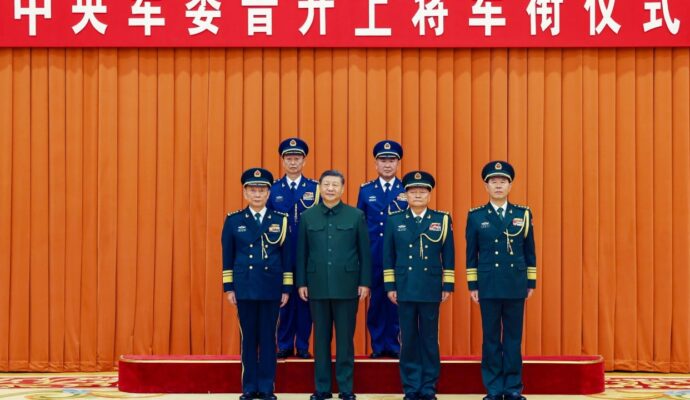US Defence Secretary Lloyd Austin never had a formal meeting with Li Shangfu, who served as China’s defence minister from March until October, when Beijing removed him from the post without giving a reason.
Washington blamed Beijing for refusing its request to set up a meeting, but the Chinese government said the US first needed to lift sanctions it imposed against Li in 2018 for buying military equipment from a Russian arms exporter.
Unofficial exchanges soared ahead of Xi-Biden meeting to smooth path for talks
Unofficial exchanges soared ahead of Xi-Biden meeting to smooth path for talks
Li’s former position has remained empty since his removal in October. The Chinese defence minister, unlike counterparts in other countries, is largely a diplomatic role, while decision-making power over the PLA is reserved for Xi as the chairman of China’s top military command, the Central Military Commission.
Xi and his entourage landed in the city on Tuesday for the 30th Asia-Pacific Economic Cooperation (Apec) summit. The rare meeting between Xi and Biden aimed to improve their countries’ relationship that has clashed on issues including trade, human rights, cutting-edge technology and the control of the synthetic opioid fentanyl.
Ties between Washington and Beijing have warmed this year, with several US cabinet members, a Congress delegation, climate envoy John Kerry and California Governor Gavin Newsom visiting China.
Taiwan is a core issue dividing Washington and Beijing and a focus of remarks by Chinese diplomats at meetings with their US counterparts.
Pointing to US arms sales to the island and meetings between American and Taiwanese officials, Beijing has accused Washington of eroding their agreement on Taiwan, which was the basis for establishing formal ties in 1979.
Taiwan urges US to speed up weapons deliveries, boost defence supply chain
Taiwan urges US to speed up weapons deliveries, boost defence supply chain
Washington has denied the allegation, saying that it had only acknowledged that Beijing sees Taiwan as part of China, without agreeing with that position.
According to Xinhua, the two leaders did not make a joint statement on the self-ruled island. However, Xi reiterated Beijing’s position, telling the US to stop arming Taiwan and support the peaceful reunification of China, it said.
“China will eventually be reunified and inevitably be reunified,” Xi said. He also described Taiwan as the “most important and most sensitive” issue in the US-China relationship.
Xi said he regarded Biden’s remarks on Taiwan during their meeting on the sidelines of the G20 summit in November 2022 as positive.
At that time, Biden said that the US did not support Taiwanese independence, did not seek to change China’s political system and had a consistent Taiwan policy.
Beijing views Taiwan as a breakaway province to be reunified with the mainland, by force if necessary. The US and most other countries do not recognise Taiwan as an independent state, but many oppose any attempt by Beijing to use force against the island.
Washington is bound by American law to arm Taiwan for the island’s self-defence and supports Taipei’s participation at international forums.
Taiwanese voters will cast their ballots for a new president on January 13. The election is expected to be a race between William Lai Ching-te of the ruling Democratic Progressive Party, who believes Taiwan to be independent, and a Beijing-friendly opposition candidate.
Can US and China give each other the reassurances they want on Taiwan?
Can US and China give each other the reassurances they want on Taiwan?
The two main opposition parties, the Kuomintang and the Taiwan People’s Party, decided on Tuesday to run a joint ticket to fight Lai. Beijing has accused Lai, now the island’s vice-president, of “seeking help from the US to pursue independence”.
Attempts to improve relations following the Group of 20 summit a year ago were derailed after a Chinese balloon flew over the US in February.
Washington said the balloon was used for surveillance and shot it down for investigation. US Secretary of State Antony Blinken then called off a planned trip to China.
In September, General Mark Milley, then chairman of the US Joint Chiefs of Staff, said the balloon’s sensors had collected no intelligence, citing US intelligence agencies.
Beijing maintains that it was a weather balloon that went astray.
From 2016 to 2021, during the administration of former US president Donald Trump, US-China relations were frustrated by a trade war, sanctions against Chinese tech and the Covid-19 pandemic.
The Biden administration lifted some – but not all – of Trump’s sanctions. It also improved ties with allies and partner states in Asia to compete with China on technology and trade.



